
Journal of Eta Maritime Science
Scope & Guideline
Unlocking the potential of maritime advancements.
Introduction
Aims and Scopes
- Maritime Trade and Economics:
Research on factors influencing maritime trade performance, competitiveness, and the economic impact of maritime operations, including case studies from various regions. - Safety and Environmental Impact:
Studies focused on safety protocols, fire safety analysis, and environmental impacts of maritime activities, such as emissions from vessels and waste management practices. - Innovative Maritime Technologies:
Exploration of new technologies in maritime operations, including autonomous vehicles, digital transformation in logistics, and energy-efficient solutions. - Maritime Policy and Governance:
Analysis of maritime policies, security issues such as piracy, and the implications of geopolitical events on maritime trade and operations. - Sustainable Maritime Practices:
Research aimed at promoting sustainable practices in shipping and port management, including energy use optimization and pollution reduction strategies.
Trending and Emerging
- Autonomous and Digital Technologies:
There is a growing trend towards research on autonomous maritime vehicles and the integration of digital technologies, reflecting the industry's shift towards automation and data-driven decision-making. - Sustainable and Alternative Fuels:
A significant increase in studies focusing on the use of sustainable fuels and energy-efficient technologies is evident, as the maritime industry seeks to reduce its carbon footprint and comply with environmental regulations. - Impact of Global Events on Maritime Operations:
Research exploring the implications of global events, such as the COVID-19 pandemic and geopolitical conflicts, on maritime trade and logistics has gained prominence, providing insights into resilience and adaptability. - Human Factors and Organizational Behavior:
Emerging themes on the psychological and organizational aspects of maritime operations, including the impact of human factors on safety and performance, are increasingly being recognized as critical areas of study. - Climate Change and Maritime Adaptation:
With the growing impact of climate change on maritime operations, research into adaptation strategies and the resilience of maritime infrastructures is becoming more prevalent, indicating a proactive approach to future challenges.
Declining or Waning
- Traditional Ship Design:
Research on conventional ship design methodologies has decreased, as the industry moves towards more innovative and sustainable design solutions that integrate modern technologies. - Basic Risk Assessment Techniques:
There is a noted decline in studies employing basic risk assessment methods, as the field shifts towards more complex, data-driven, and integrated risk management frameworks. - General Maritime Education:
While education remains important, the focus on general maritime education has waned in favor of specialized training programs that address contemporary challenges such as digital transformation and environmental sustainability. - Conventional Energy Sources:
Research related to traditional fossil fuel-based energy sources for maritime operations is declining, as there is a growing emphasis on alternative energy sources and sustainability in maritime practices. - Static Navigation Techniques:
The focus on static navigation methodologies has diminished, with a shift towards dynamic and adaptive navigation systems that utilize advanced technologies and real-time data.
Similar Journals
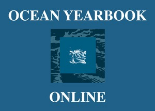
Ocean Yearbook
Bridging Disciplines for a Sustainable Ocean FutureOcean Yearbook, published by BRILL, is a leading academic journal in the field of maritime law and ocean governance, providing a comprehensive platform for researchers and practitioners in this vital area. With an ISSN of 0191-8575 and E-ISSN 2211-6001, this journal offers valuable insights and critical analyses on contemporary issues affecting the world's oceans, promoting interdisciplinary dialogue among scholars in law, environmental studies, and policy-making. Currently ranked in the Q2 quartile for Law, this journal is positioned among the top-tier publications, reflecting its commitment to academic excellence and relevance. Ocean Yearbook is essential reading for those looking to stay abreast of legal developments and emerging challenges in ocean governance, contributing significantly to policy discussions and academic scholarship worldwide. Its accessibility through subscription, combined with its ongoing commitment to high-quality research, makes it an indispensable resource for students, researchers, and professionals dedicated to understanding and protecting marine ecosystems.

Maritime Business Review
Empowering Maritime Professionals with Cutting-edge ResearchMaritime Business Review, published by Emerald Group Publishing Ltd, is a leading academic journal dedicated to advancing knowledge in the fields of maritime business, transportation, and management. With an ISSN of 2397-3757 and E-ISSN of 2397-3765, this journal has established itself as a vital resource for researchers and practitioners alike, particularly noted for its contribution to the domains of Business and International Management, Management of Technology and Innovation, Strategy and Management, and Transportation. The journal is ranked in the prestigious Q2 quartile in each of these categories as of 2023, reflecting its impactful research and relevance in contemporary academic discourse. Although currently not an Open Access journal, it offers robust access options through institutional subscriptions—making its rich repository of cutting-edge research readily available to scholars and professionals. Since its inception in 2016 and continuance to 2024, Maritime Business Review has emerged as an essential platform for both emerging and established academics to share innovative insights and enhance collaborative efforts within the international maritime business community.

Journal of East Asia and International Law
Navigating the Complexities of East Asian Legal SystemsThe Journal of East Asia and International Law, published by the YIJUN Institute of International Law, serves as a vital platform for scholarly discourse in the field of law, with a particular focus on the complexities of East Asian legal systems and their interactions within the global context. Established in 2011 and based in Seoul, South Korea, this journal has been pivotal in fostering research that examines legal issues impacting East Asia, making significant contributions to the understanding of international law in this dynamic region. With its ISSN 1976-9229, the journal provides a valuable resource for researchers, professionals, and students interested in the evolving legal landscapes of East Asia. Though currently categorized in the Q4 quartile for law in the Scopus rankings, its dedication to enhancing legal scholarship positions it as a relevant player among emerging international law journals, encouraging submissions that explore innovative legal approaches and analyses. As ongoing interdisciplinary discussions deepen, the Journal of East Asia and International Law aims to enrich the academic community's understanding of international legal frameworks within East Asian contexts.

International Maritime Health
Bridging the Gap in Maritime Health KnowledgeInternational Maritime Health is a distinguished, open-access journal published by VIA MEDICA that has been pivotal in disseminating research related to maritime health since its inception in 1999. With an ISSN of 1641-9251 and an E-ISSN of 2081-3252, the journal focuses on various aspects of Infectious Diseases, Medicine, and Public Health, making significant contributions to environmental and occupational health, particularly in maritime contexts. As of 2023, it enjoys a Q3 ranking in prominent categories, highlighting its relevance and impact in the field, supported by Scopus ranking that places it competitively within its domains. Open access since 2005, International Maritime Health provides researchers, professionals, and students vital resources to understand and tackle health challenges faced in maritime environments, facilitating the exchange of knowledge that is crucial for enhancing health outcomes in this unique sector. The journal is based in Gdansk, Poland, emphasizing its global outreach and commitment to addressing maritime health issues.
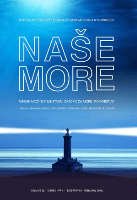
Nase More
Unleashing Ideas in Process Chemistry and TransportationNase More is a prominent open-access journal dedicated to the fields of Ocean Engineering, Process Chemistry and Technology, Water Science and Technology, and Transportation. Published by the University of Dubrovnik, this journal has been disseminating valuable research since its inception in 1994, with a commitment to providing unrestricted access to scholarly work since 2003. The journal boasts a diverse range of submissions that contribute to the advancement of knowledge and innovation within its scope, making it an essential resource for researchers, professionals, and students alike. With a current impact factor reflected in its Category Quartiles as Q4 in Ocean Engineering, Q3 in Process Chemistry and Technology, and Q4 in related fields, Nase More is positioned to meet the evolving needs of its readership. Located in the picturesque city of Dubrovnik, Croatia, this journal not only serves as a platform for rigorous academic inquiry but also fosters collaboration and dialogue among experts in environmental science and engineering disciplines.
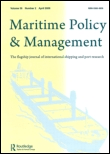
Maritime Policy & Management
Pioneering Insights in Ocean Governance and ManagementMaritime Policy & Management, published by Routledge Journals, Taylor & Francis Ltd, is a premier international journal that explores the complex and multifaceted aspects of maritime affairs. Since its inception in 1976, this journal has established itself as an essential resource for researchers, practitioners, and policymakers in the fields of Geography, Planning and Development, Management, Monitoring, Policy and Law, and Ocean Engineering. With an impressive impact factor evidenced by its placement in the Q1 category for multiple disciplines and high rankings in Scopus, this journal continues to contribute significantly to the academic and professional discourse surrounding maritime issues. Although it is not an open-access journal, it provides a wealth of rigorous peer-reviewed research that enhances understanding and informs best practices in the maritime sector. Positioned at the forefront of maritime studies, Maritime Policy & Management remains a vital publication for those aiming to advance knowledge and policy in this critical area of global development.
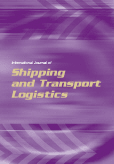
International Journal of Shipping and Transport Logistics
Pioneering Insights for Sustainable Shipping PracticesWelcome to the International Journal of Shipping and Transport Logistics, a premier academic journal published by INDERSCIENCE ENTERPRISES LTD that serves as a vital platform for researchers, practitioners, and students in the fields of logistics, transportation, and management. Established in 2009 and converging through to 2024, this journal is committed to advancing scholarly discussions and innovations related to shipping logistics, supply chain management, and the integration of technology in transportation systems. As evidenced by its Q3 rankings across multiple categories in the 2023 Scopus classification, including Business and International Management, and Management of Technology and Innovation, this journal is recognized for its contributions to the academic community. Though currently not an open access journal, it offers subscriptions that facilitate access to high-quality research and case studies relevant to contemporary challenges in the shipping and transport logistics sectors. Engage with the latest findings and insights that are critical for developing sustainable and efficient transportation strategies globally.
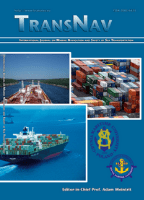
TransNav-International Journal on Marine Navigation and Safety of Sea Transportation
Charting New Waters in Ocean Engineering.TransNav - International Journal on Marine Navigation and Safety of Sea Transportation is a leading scholarly publication that addresses the critical themes of marine navigation and maritime safety. Published by Gdynia Maritime University in Poland, this open-access journal has been a vital resource since its inception in 2007, fostering a global dialogue among researchers, maritime professionals, and students. With an impressive trajectory of convergence from 2019 to 2024, TransNav is recognized for its impact in the realm of Ocean Engineering, Oceanography, and Transportation, holding a notable Q3 ranking in Ocean Engineering and Q4 rankings in both Oceanography and Transportation for 2023. The journal serves as an essential platform for disseminating research findings and advancements that enhance safety protocols and navigation strategies in sea transportation, thus contributing to the sustainability and efficiency of maritime operations worldwide. Researchers can access its wealth of information through various academic databases, ensuring that your work remains on the cutting edge of this vital field.

Maritime Studies
Connecting Scholars for a Healthier OceanMaritime Studies is a premier journal published by Springer Heidelberg, focusing on interdisciplinary research in the fields of aquatic sciences, development, geography, and environmental management. With an ISSN of 1872-7859 and an E-ISSN of 2212-9790, the journal serves as a critical platform for the dissemination of innovative studies that advance our understanding of maritime environments and their socio-economic implications. The journal boasts an impressive Q2 ranking across multiple categories, including Aquatic Science and Geography, underscoring its significance in the academic community. With a commitment to fostering dialogue on maritime policy, management, and technological advancements, Maritime Studies is essential reading for researchers, policymakers, and students dedicated to promoting sustainable practices in ocean and waterway resource management. As this journal converges between 2012 to 2024, it continues to uphold the highest academic standards, facilitating impactful research that shapes the discourse in marine studies and beyond.

Scientific Journals of the Maritime University of Szczecin-Zeszyty Naukowe Akademii Morskiej w Szczecinie
Charting new territories in marine research and development.Scientific Journals of the Maritime University of Szczecin (Zeszyty Naukowe Akademii Morskiej w Szczecinie) is a premier academic journal published by the Maritime University of Szczecin, dedicated to advancing knowledge in the maritime sciences and related disciplines. With an ISSN of 1733-8670 and an E-ISSN of 2392-0378, the journal has been a vital resource for researchers, professionals, and students since its transition to Open Access in 2008, ensuring that valuable research is readily accessible to a global audience. The journal aims to disseminate high-quality original research, reviews, and case studies related to maritime engineering, marine technology, nautical science, and environmental studies, thereby fostering innovation and collaboration within the field. Situated in Szczecin, Poland, the journal plays a significant role in enhancing the maritime academic landscape and contributing to sustainable development within the maritime industry.